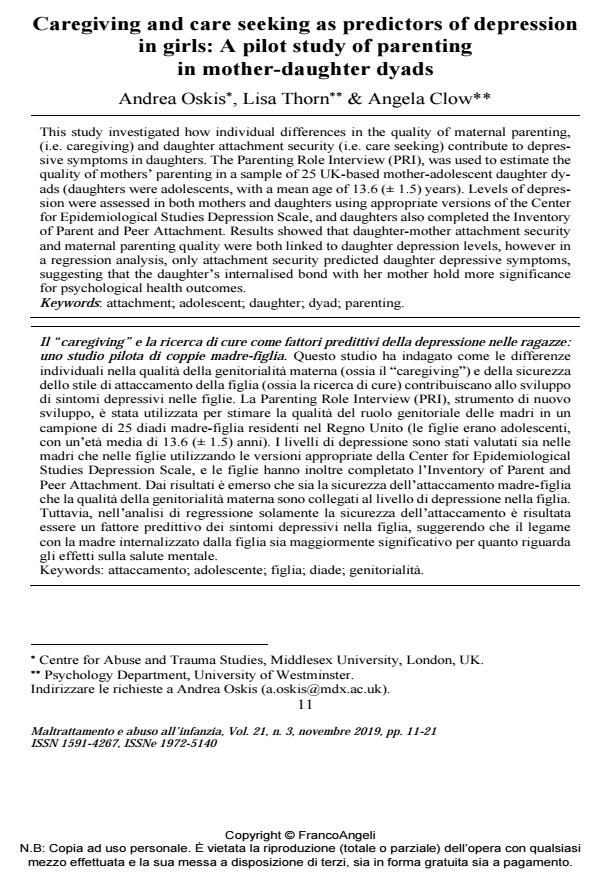Caregiving and care seeking as predictors of depression in girls: A pilot study of parenting in mother-daughter dyads
Journal title MALTRATTAMENTO E ABUSO ALL’INFANZIA
Author/s Andrea Oskis, Lisa Thorn, Angela Clow
Publishing Year 2019 Issue 2019/3 Language English
Pages 11 P. 11-21 File size 219 KB
DOI 10.3280/MAL2019-003002
DOI is like a bar code for intellectual property: to have more infomation
click here
Below, you can see the article first page
If you want to buy this article in PDF format, you can do it, following the instructions to buy download credits

FrancoAngeli is member of Publishers International Linking Association, Inc (PILA), a not-for-profit association which run the CrossRef service enabling links to and from online scholarly content.
This study investigated how individual differences in the quality of maternal parenting, (i.e. caregiving) and daughter attachment security (i.e. care seeking) contribute to depressive symptoms in daughters. The Parenting Role Interview (PRI), was used to estimate the qual-ity of mothers’ parenting in a sample of 25 UK-based mother-adolescent daughter dyads (daughters were adolescents, with a mean age of 13.6 (± 1.5) years). Levels of depression were assessed in both mothers and daughters using appropriate versions of the Center for Epidemiological Studies Depression Scale, and daughters also completed the Inventory of Parent and Peer Attachment. Results showed that daughter-mother attachment security and maternal parenting quality were both linked to daughter depression levels, however in a regression analysis, only attachment security predicted daughter depressive symptoms, suggesting that the daughter’s internalised bond with her mother hold more significance for psychological health outcomes.
Keywords: Attachment; adolescent; daughter; dyad; parenting.
- Armsden, G. C., & Greenberg, M. T. (1987). The inventory of parent and peer attachment: Individual-differences and their relationship to psychological well-being in adolescence. Journal of Youth and Adolescence, 16(5), 427-454. DOI: 10.1007/BF02202939
- Bakermans‐Kranenburg, M. J., Juffer, F., & Van Ijzendoorn, M. H. (1998). Interventions with video feedback and attachment discussions: Does type of maternal insecurity make a difference? Infant Mental Health Journal: Official Publication of The World Association for Infant Mental Health, 19(2), 202-219.
- Barber, B. K., & Harmon, E. L. (2002). Violating the self: Parental psychological control of children and adolescents. In: B. K. Barber, (Ed). Intrusive parenting: How psychological control affects children and adolescents (pp. 15-52). Washington, DC, US: American Psychological Association.
- Bifulco, A., Bernazzani, O., Moran, P. M., & Ball, C. (2000). Lifetime stressors and recurrent depression: Preliminary findings of the Adult Life Phase Interview. Social Psychiatry and Psychiatric Epidemiology, 35(6), 264-275.
- Bifulco, A., Moran, P., Jacobs, C., & Bunn, A. (2009). Problem partners and parenting: Exploring linkages with maternal insecure attachment style and adolescent offspring internalizing disorder. Attachment & Human Development, 11(1), 69-85. DOI: 10.1080/14616730802500826
- Duchesne, S., & Ratelle, C. F. (2014). Attachment security to mothers and fathers and the developmental trajectories of depressive symptoms in adolescence: Which parent for which trajectory? Journal of youth and adolescence, 43(4), 641-654.
- Fink, D. S., Hu, R., Cerdá, M., Keyes, K. M., Marshall, B. D., Galea, S., & Martins, S. S. (2015). Patterns of major depression and nonmedical use of prescription opioids in the United States. Drug and alcohol dependence, 153, 258-264.
- Landis, J. R., & Koch, G. G. (1977). Measurement of observer agreement for categorical data. Biometrics, 33(1), 159-174. DOI: 10.2307/2529310
- Main, M., Kaplan, N., & Cassidy, J. (1985). Security in Infancy, Childhood, and Adulthood: A Move to the Level of Representation. Monographs of the Society for Research in Child Development, 50(1/2), 66-104. DOI: 10.2307/3333827
- Manson, S. M., Ackerson, L. M., Dick, R. W., Baron, A. E., & Fleming, C. M. (1990). Depressive symptoms among American Indian adolescents: Psychometric characteristics of the Center for Epidemiologic Studies Depression Scale. Psychological Assessment, 2(3), 231. DOI: 10.1037/1040-3590.2.3.231
- Meltzer, H., Gatward, R., Goodman, R., & Ford, T. (2000). Mental health of children and adolescents in Great Britain. TSO: London.
- Paulson, S. E., & Sputa, C. L. (1996). Patterns of parenting during adolescence: Perceptions of adolescents and parents. Adolescence, 31(122), 369-381.
- Radloff, L. S. (1991). The use of the Center for Epidemiologic Studies Depression Scale in adolescents and young adults. Journal of Youth and Adolescence, 20(2), 149-166. DOI: 10.1007/BF01537606
- Sheeber, L., Hops, H., & Davis, B. (2001). Family processes in adolescent depression. Clinical child and family psychology review, 4(1), 19-35. DOI: 10.1023/A:1009524626436
- Smetana, J. G. (1995). Parenting styles and conceptions of parental authority during adolescence. Child development, 66(2), 299-316. DOI: 10.2307/1131579
- Steinberg, L. (2001). We know some things: Parent-Adolescent relationships in retrospect and prospect. Journal of research on adolescence, 11(1), 1-19. DOI: 10.1111/1532-7795.00001
- Thapar, A., Collishaw, S., Pine, D. S., & Thapar, A. K. (2012). Depression in adolescence. Lancet, 379(9820), 1056-1067. DOI: 10.1016/S0140-6736(11)60871-4
- Vangelisti, A. L. (1992). Older adolescents’ perceptions of communication problems with their Parents. Journal of Adolescent Research, 7(3), 382-402. DOI: 10.1177/074355489273007
- Wilkins, D. (2017). Using Q methodology to understand how child protection social workers use attachment theory. Child & Family Social Work, 22, 70-80.
- Wolfradt, U., Hempel, S., & Miles, J. N. (2003). Perceived parenting styles, depersonalisation, anxiety and coping behaviour in adolescents. Personality and individual differences, 34(3), 521-532. DOI: 10.1016/S0191-8869(02)00092-2
Andrea Oskis, Lisa Thorn, Angela Clow, Caregiving and care seeking as predictors of depression in girls: A pilot study of parenting in mother-daughter dyads in "MALTRATTAMENTO E ABUSO ALL’INFANZIA" 3/2019, pp 11-21, DOI: 10.3280/MAL2019-003002